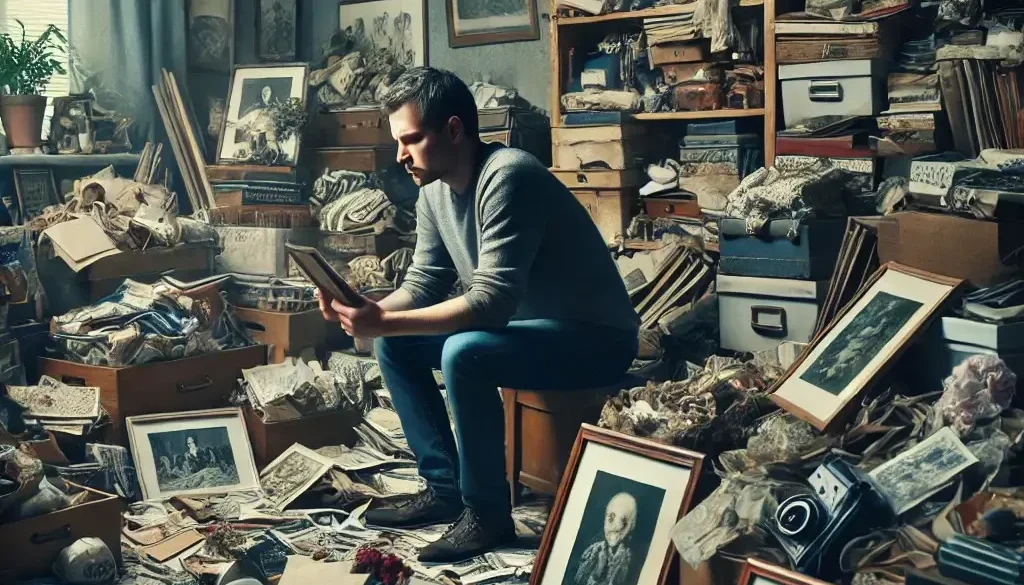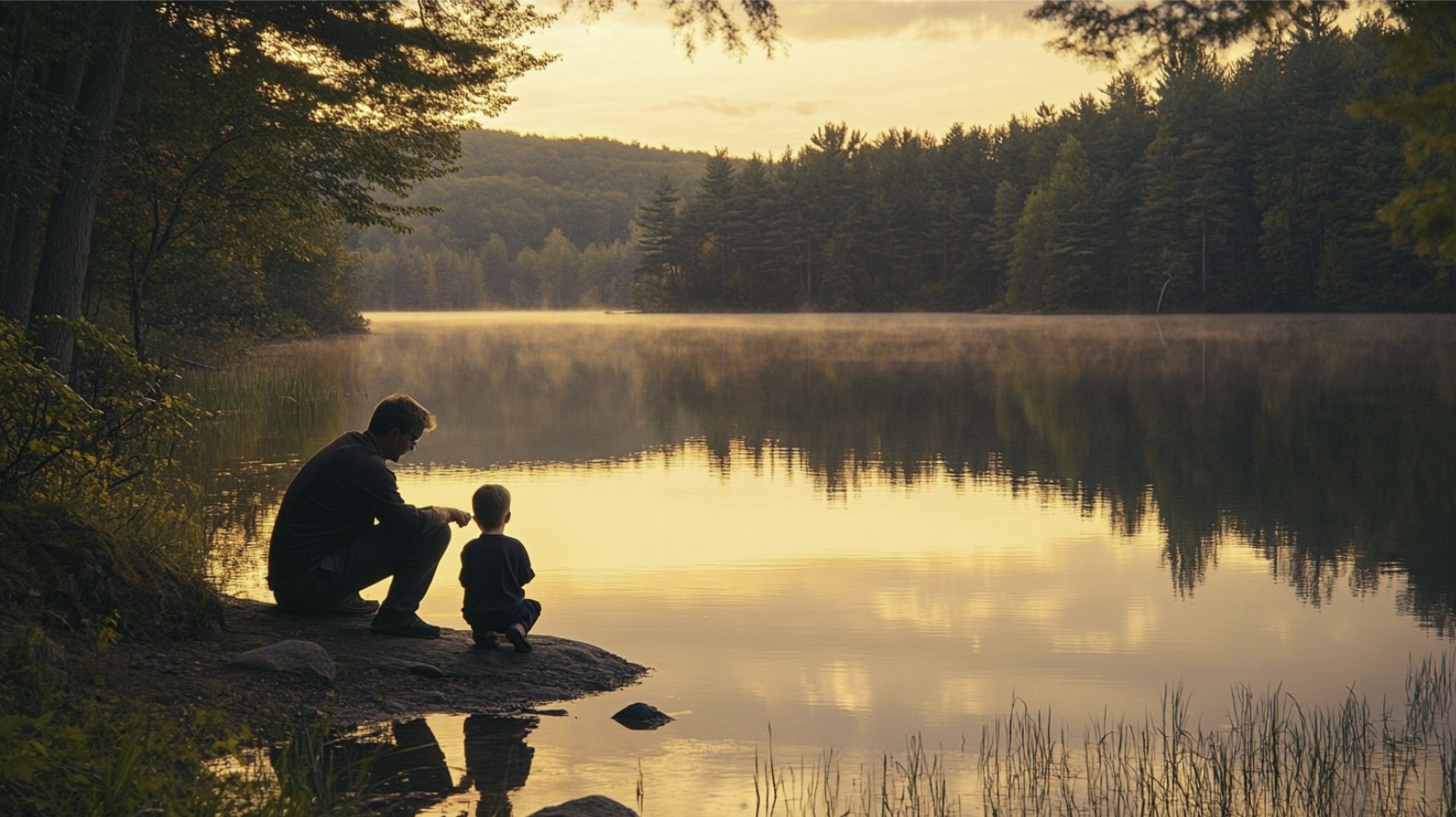What are your memories of love from childhood? Was it your parents taking you to the park, or your father playing ball games with you? For many, childhood love is warm and vivid. However, when I look back on my own childhood, my mind goes blank. I cannot feel love, nor do I recall warmth.
My mother suffered from depression after I was born. A heavy, suffocating atmosphere always loomed over our home, as if an invisible cloud shrouded each day. I never truly saw my mother happy, nor did I ever feel her love.
My first memory of my father is from when he took me to a crowded shopping mall. I was squeezed between the legs of towering adults, tightly holding onto his large hand. But somehow, we got separated. I found myself lost, surrounded only by the unfamiliar legs of strangers.
Growing up in this emotional emptiness, I developed a habit of hoarding. I collected all sorts of things—toys, handicrafts, books, stamps, porcelain—always feeling that happiness was hidden in one of these treasures, that the answer to fulfillment lay in a book somewhere. I believed that if I accumulated enough things, I could fill the void inside me. Yet, this habit of hoarding followed me well into my fifties, ultimately bringing only chaos and distress.
My home became cluttered with objects. The bed, hallways, and every corner were occupied. My children hesitated to invite friends over. I didn’t just hoard my own belongings—I also kept my children’s things, including their old essays, drawings, and toys. Hoarding was no longer just a habit; it had begun to affect my life and family. I realized that my obsession wasn’t about the items themselves—it was a deeper fear. A fear of forming relationships, of confronting the absence of love.

My wife, a Christian, often shared with me the concept of God’s love. I told her that I had always known, intellectually, that parents were supposed to love their children, but I had never truly felt that love myself. As a child, I experienced more tension and sadness than warmth. I asked her, “Do you know how hard it is for me? If I couldn’t even feel my parents’ love, how can I possibly perceive or believe in God’s love, or even human love?”
One day, while listening to a sermon by Zhiming Yuan, I had a fleeting experience of divine love—like the sun shining upon all people. “He makes His sun rise on the good and the evil, and sends rain on the just and the unjust.” It was an unconditional, equal, and immense love. However, that moment of inspiration was fleeting, and the anxieties of life quickly pulled me back to reality.
Recently, I began to explore my inner world, diving into the psychological roots of hoarding disorder. In a video, I heard something that struck a deep chord: “Hoarders often lack secure connections with their parents in childhood, so they seek comfort in objects, creating a substitute attachment.” These words hit me so hard that I almost cried. I finally understood—I had been hiding behind my possessions because I had never truly experienced love and had always feared facing real human relationships.
On the day this realization dawned on me, something in my heart seemed to open. I recalled small moments of my father’s care: After his retirement, he returned to work to support my college education, only stopping when he suffered a stroke. Later, when I was working and attending night school to study computer science, he prepared dinner for me every evening, waiting for me to come home. Even after his stroke, despite his frailty, he still remembered my favorite foods and would heat them for me in advance.
One time, he absentmindedly burned the food. I scolded him, and he stood there, looking like a child who had done something wrong.
Thirty years have passed since that moment, but only today have I finally felt the love my father had for me. I had been so preoccupied with the busyness of life—completing tasks, meeting goals—that I had overlooked the quiet, unwavering love in his daily care. Just as the writer Ziqing Zhu only saw his father’s “back” later in life, I, too, only now truly see my father’s love.

The next day, during my lunch break, I took a walk down the snowy street. It was a bright, clear day. The vast blue sky stretched endlessly above me, and soft white clouds drifted like the ones I had seen in childhood. In the distance, high-rise buildings looked as tiny as toy models. Sunlight shone on my face, and in that instant, tears welled up in my eyes. I didn’t know why—I just suddenly felt love.
My parents’ love, all the little moments of their care, was like this sunlight touching my skin—warm and real.
I walked, tears streaming down my face, feeling both immense happiness and deep sorrow. My father had passed away more than twenty years ago. On the day he died, I felt helpless, but I couldn’t shed a single tear. Now, all of a sudden, I felt his love, and for the first time, I grieved his passing.
As I stood there crying, two tall Black volunteers approached me. They were from NightShift, a Christian organization that helps the homeless. With concern, they asked, “Sir, would you like to have a cup of coffee?” At that moment, I felt a bit embarrassed for crying in public. I declined their coffee but was deeply moved by their kindness.
After work, I sat at the front of the train, watching the sunset shine through the window onto my face. Once again, tears flowed down my cheeks. It was the second time I had cried that day. I cried quietly, like a gentle drizzle, feeling as though my father was watching over me. It was as if, after getting lost in that crowded mall as a child, I had finally found him again. His love had always been there, following me like a shadow.

That day, I felt truly happy. My heart was no longer restless or preoccupied with endless tasks. Instead, it was peaceful and warm, like sunlight reflecting on the surface of a lake.
I finally understood my father’s love. I finally, genuinely felt the love of Jesus and the love of this world. I began reflecting on my relationship with my children. Do I truly love them? Or am I merely anxious about raising them “correctly”? In the past, I might have been more focused on fulfilling my parental duties rather than simply loving and being present with them. But now, I understand that true love is like the sun—it exists without asking for anything in return. It simply shines, radiating warmth naturally.
It took me nearly sixty years, traveling through the long and winding roads of life, to move from numbness and avoidance to finally feeling the tenderness of love. I have journeyed through the narrow corridors of time, and at last, my heart has begun to heal.
I have started decluttering, slowly clearing out the hoarded possessions in my home. I am no longer obsessed with accumulation, but instead, I cherish the time spent with my family. Whenever I feel uneasy, I remind myself: true security comes from love, not from things. Hoarding is no longer a shackle—it has become part of my journey to learning love.
I believe this love will continue to heal me, reconnecting me with the world. And I believe that as I learn to love unconditionally, my children will feel that warmth too—the love of parents, flowing from the infinite heart of the universe.
I remember, during a university break, my father took me to the countryside where he worked after retirement. There was a vast orchard. I followed him through the fields, the morning air filled with the sweet fragrance of fruit. We walked along the dusty path together.
Now, after more than twenty years, I imagine my father waiting for me in another orchard in the sky—where golden pears and crimson apples grow abundantly.
I hear the gentle murmuring of a brook. The fruit, bursting with sweetness, ripens along the water’s edge, bathed in golden sunlight. My father stands among the trees, waiting for me. He is there, in the sunlight, waiting in love.
Postscript: In 2013, hoarding disorder was reclassified as an independent mental illness, influenced by complex genetic and environmental factors. In Canada, approximately 6% of the population struggles with hoarding disorder. Let’s educate ourselves and extend understanding to those affected. If someone you know suffers from hoarding disorder, I hope this article can help them.
Xin Yu | February 15, 2025
